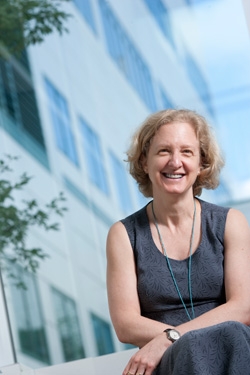Keeping people healthy is better for them—and less expensive—than caring for them when they are acutely ill.

An architect’s rendering of the new Dartmouth Health Connect medical practice opening in February 2012, on Allen Street in Hanover. Work on the building is slated to begin this month. (graphic by UK Architects)
That’s the goal of Dartmouth Health Connect, a new primary care practice opening in February 2012, in conjunction with Dartmouth College, Dartmouth-Hitchcock, and Iora Health, a Cambridge, Mass., health-care company started by a physician who is turning the conventional method of delivering health care upside down.
“What everyone else has been doing is tweaking the existing model. Maybe what we need to do is start from the beginning, from scratch,” says Iora founder Dr. Rushika Fernandopulle.
A team made up of two Dartmouth-Hitchcock physicians, a nurse, practice coordinator, and several health coaches will be accessible in many ways—they’ll email, text and telephone patients. They’ll hold computer video chats. And they’ll run groups to help patients with chronic conditions, or those who want to take up yoga, stop smoking, or lose weight.

Joel Lazar, MD, Dartmouth-Hitchcock’s family medicine section chief, will be one of two physicians at Dartmouth Health Connect. (photo by Mark Washburn, DHMC)
“We are honored to be part of this. But Dartmouth had the vision to lead,” Fernandopulle says. “Their leaders approached us and said they were looking into ways to improve how health care is delivered and the value of employees’ health care.”
“Here’s a model and a person that I really want to work with,” says Dr. John Butterly, Dartmouth-Hitchcock’s executive vice president for medical affairs. “We very much want to partner with Dartmouth College and Dr. Fernandopulle.”
Dartmouth officials say the new practice could reduce health-care costs over time for patients enrolled in the new practice. Patients won’t be charged a co-pay fee for each visit, as they are in many practices. And the practice won’t run on money collected through the usual fee-for-service model, billing insurance for each procedure and visit. Instead, Dartmouth will pay Iora a monthly fee for each patient. The payment model provides an incentive to focus on patients’ health, says Melissa Miner, Dartmouth’s new wellness director.
“We think it’s a way to improve health and lower the trend in health-care costs,” says Miner. “As part of its overall focus on employee health and wellness, Dartmouth is looking for ways to connect employees to health care resources that encourage their engagement by simplifying the experience and breaking down traditional barriers, all of which foster a more preventative approach to health.”
And, says Miner, the practice’s team-based model will allow clinicians to provide comprehensive support to patients. Those with complicated health-care needs and chronic conditions may have the most to gain from the new practice, while all will certainly benefit, she says.
The practice will enroll adult patients—Dartmouth employees, their adult dependents, and Dartmouth retirees who are not yet eligible for Medicare. Enrollment is voluntary. Those who are interested may call Dartmouth Health Connect at (603) 738-1164 or email the practice at info@dartmouthhealthconnect.com.

Dartmouth-Hitchcock Medical Center internist Brooke Herndon, MD, will staff the new practice. (photo by Mark Washburn)
Dartmouth Health Connect will also put into practice the research and theory that has gained Dartmouth national recognition for work done at The Dartmouth Institute and The Dartmouth Center for Health Care Delivery Science.
“It’s what Dartmouth has been talking about academically and theoretically for quite a while and this is a means of enacting it. That puts a lot of gravitas behind this effort,” says Dr. Joel Lazar, Dartmouth-Hitchcock’s family medicine section chief, who along with Dartmouth-Hitchcock Medical Center internist Dr. Brooke Herndon will staff the new practice. “This is revolution, much more than evolution. I’m glad that the College is at the forefront, rather than catching up after everyone else has done it.”
Dr. Al Mulley Jr., director of The Dartmouth Center, says the practice is “spot on for what we’ve been promoting. It’s basically creating a team to provide primary care that recognizes the importance of talking to—and listening to—patients.”
Says Fernandopulle, “Dartmouth is a national leader in thinking about health-care delivery. It’s one thing to document the problems of the current system. It’s another thing to try and figure out solutions to it. We’re actually going to do that here.”
Iora Health has a five-year contract with the College to run the new program. Through an agreement with Dartmouth-Hitchcock, Lazar and Herndon will work for Dartmouth Health Connect and continue to see patients part-time at DHMC.
Fernandopulle has started this type of practice before. Born in Sri Lanka (the Iora name comes from that of a small, yellow bird native to Sri Lanka) and raised in Baltimore, the Harvard-trained physician/entrepreneur ran clinics in Atlantic City, N.J., for casino workers and in Seattle, Wash., for Boeing employees. Fernandopulle’s work was featured in The New Yorker in January 2011.
Atul Gawande, the story’s author and a physician, wrote that Fernandopulle’s practice “reinvented the idea of a primary-care clinic in almost every way.”
Health coaches, an idea Fernandopulle got while on a medical mission in the Dominican Republic, are at the heart of Iora’s model. The coaches can spend more time with patients and often connect with them on a basic level.
“We recruit for attitude and train for skill,” Fernandopulle told Gawande. “We don’t recruit from health care. This kind of care requires a different mind-set from usual care.”
Fernandopulle is setting up practices like Dartmouth’s in several other locations, including in Las Vegas, for workers from the same casino union as those in New Jersey. He hopes to learn from these diverse settings, he says. And his DHMC colleagues, Lazar and Herndon, hope to bring lessons back to the medical center from the new downtown Hanover practice, which will be located on Allen Street, in the former location of Omer and Bob’s sports shop. Construction on the site is slated to begin later this month.
Herndon read The New Yorker story and says she’s thrilled that the same pioneering model will be put to work in Hanover.
“It’s kind of amazing to have that group of people land here,” she says of Iora.
